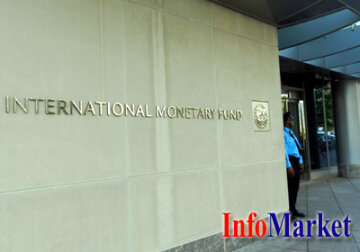
The IMF to increase support to Moldova by $267 million and bring its total financing under the current program to $815 million.
As noted in the IMF report, a staff-level agreement on this issue was reached by the IMF team and the Moldovan authorities. The agreement is to be approved by the IMF Executive Board in May. It is underlined that the Moldovan authorities have requested from the IMF an increase in financial aid by about $267 million to help the country cope with the consequences of the war in Ukraine and the rise in world energy and food prices. Following recent energy price hikes and a lingering pandemic, the war in Ukraine and international sanctions against Russia and Belarus have significantly worsened Moldova's short-term economic prospects and caused its external and fiscal accounts to deteriorate. It is planned that increased IMF financing will help Moldovan authorities contain short-term risks and provide resources to address urgent humanitarian and socioeconomic needs, while stimulating funding from other donors. The Fund said an IMF mission led by Ruben Atoyan held discussions from April 4 to 11 on the possibility of increasing the amount of funding. At the end of the mission, Ruben Atoyan said the IMF staff and the team will recommend the IMF to increase support for Moldova by $267 million, while bringing the total amount of financing within the program up to $815 million. The agreement will be approved by the IMF Executive Board, which will consider the request in May. The first disbursement under the augmented program in the amount of SDR108.2 million (about $149 million) would be made available immediately with the completion of the first review and allocated for budgetary support. As noted by IMF experts, the war in Ukraine has resulted in significant spillovers to the Moldovan economy. Real GDP is expected to stagnate this year, with projections subject to high uncertainty. Disruptions in trade and higher commodity prices are expected to widen the current account deficit to 13.3 percent of GDP this year. Urgent balance of payments financing needs arising from the escalating shocks are estimated to be about $1.7 billion in 2022-23 and expected to be financed by IMF financing and other donor assistance. Amid temporary liquidity pressures triggered at the onset of the war, the banking sector has shown resilience supported by strong liquidity and capital buffers. The authorities are appropriately prioritizing measures to deal with the humanitarian crisis in an already complex environment. Fiscal policy remains focused on managing the sizeable influx of refugees and mitigating adverse effects of rising energy and food prices. Within its mandate of price and financial stability, the National Bank of Moldova has raised the policy rate to contain inflation and intervened in the foreign-exchange market to smooth exchange rate volatility. Despite the challenging landscape, the implementation of the program’s structural commitments through end-March—including in the areas of anti-corruption and rule of law, fiscal governance, financial sector oversight, and state-owned enterprise regulatory reforms—has been strong. The fiscal deficit is expected to widen to about 7.2 percent of GDP this year due to lower revenues and higher spending on humanitarian and economic support. The evolving fiscal financing gap would be closed by mobilizing financing from the IMF and other partners to complement that available from domestic capital markets. While public debt is projected to increase in the near term, the authorities are committed to maintaining debt sustainability as the crisis abates, while preserving fiscal space for ambitious governance reforms and development spending. "The IMF team welcomes the authorities’ commitment to the program’s core aims of strengthening governance and institutional frameworks and addressing long-standing developmental needs. The ambitious structural reform agenda remain critical for creating conditions for sustainable and inclusive long-term growth. // 13.04.2022 – InfoMarket







